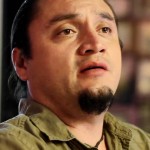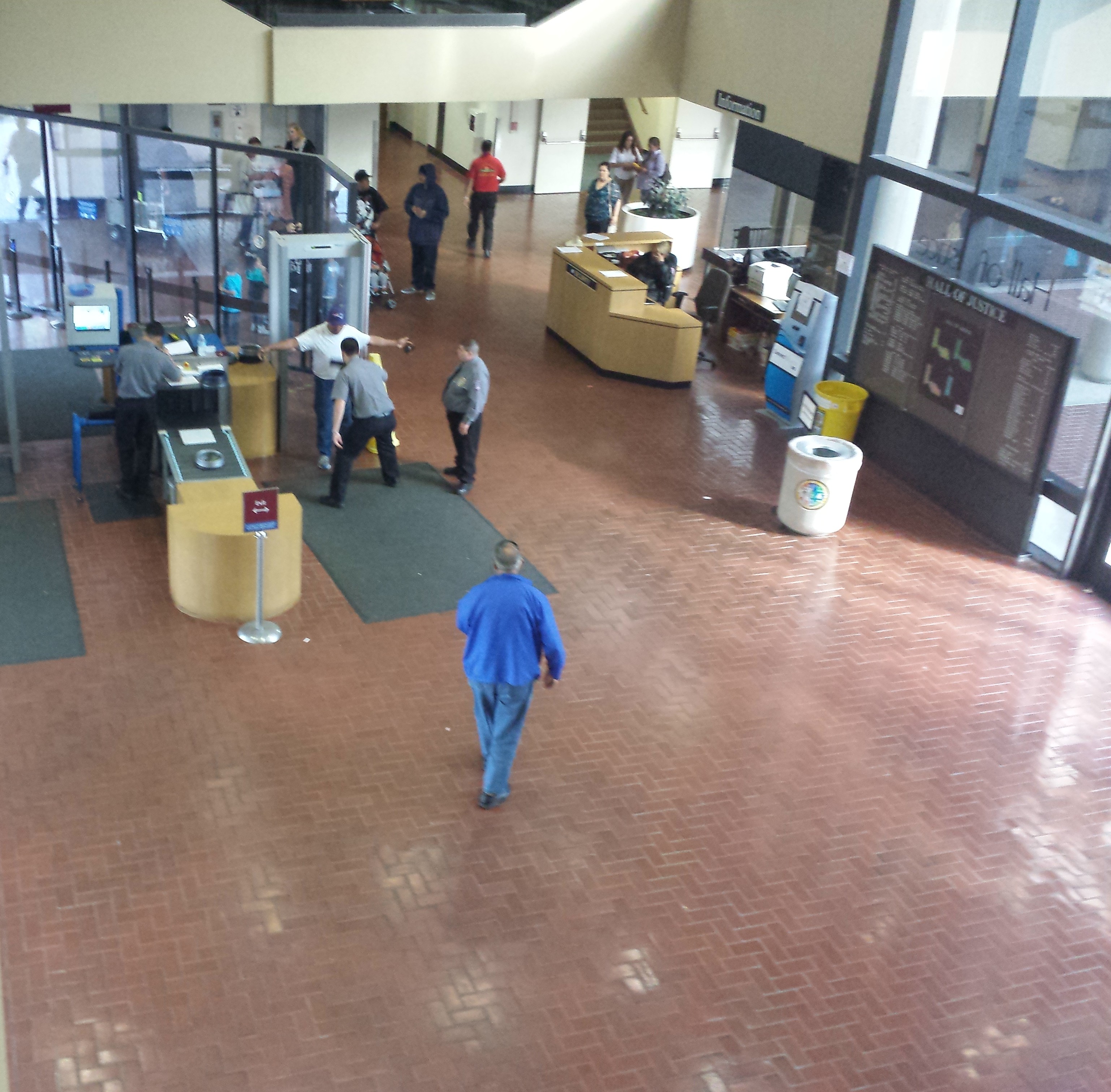
BY RAUL HERNANDEZ
VENTURA COUNTY COURTHOUSE, CALIF. – Community Activist Francisco Romero claims that he was targeted by Oxnard police officers when he was given five jaywalking tickets for his involvement in a 2013 protest march against police brutality and fatal shootings.
After examining the evidence against him, including a video that was taken by undercover officers during a 2013 protest march, Romero said he conclude that police were out to get him.
“I felt immediately that I was being targeted,” he said.
Romero testified on Monday at a hearing to determine whether there was selective enforcement of the law, violating Romero’s constitutional rights. Romero was the only person given the jaywalking tickets during the 2013 protest march that attracted about 150 people.
There were more than 90 Oxnard police officers, including undercover officers, police strike teams and SWAT units, who were assigned to maintain public safety. Police also brought an armored vehicle to the protest in case it was needed, police documents indicate.
Uniformed police weren’t visible during the two-mile trek, which began at Camino del Sol Park and ended in front of police headquarters, court evidence indicated.
Also testifying on Monday was the mother of a man who died of asphyxiation while under the custody of Oxnard police. The medical examiner ruled that death a homicide. In addition, the sister of another man who was mistakenly gunned down by Oxnard officers took the stand.
Police have testified at the hearing that Romero was never a target, and the video recording proves that he was involved in leading the crowd to commit jaywalking that stopped traffic, including temporary blocking Oxnard boulevard while protestors crossed the busy street.
Deputy District Attorney Susan Park said Romero was the only one given the tickets because he is the only individual who could be identified among the protestors.
Commissioner Anthony Sabo who is presiding over the hearing is weighing testimony and evidence to determine whether the issuance of the five tickets violated the constitution as spelled out in the 1975 Murgia vs. Municipal Court Case.
The California Supreme Court ruled in the Murgia case that a defendant may be entitled to a dismissal of criminal charges if he can prove that there was selective prosecution for improper purposes.
Before Monday’s testimony began, Judge Sabo told Romero’s lawyer Jaime Segall Gutierrez and Park that there have been four days of testimony stretched over several months. Sabo noted that the case has lingered in his court for months because of conflicting court schedules.
According to Segall Gutierrez, 15 oxnard police officers, including two assistant chiefs, were subpoenaed by the defense to testified at this hearing.
If Sabo rules against Romero, a trial date will be set.
Monday, both sides finished putting witnesses on the stand, and the judge ordered the attorneys to return on Feb. 25 to make final arguments.
The Oct. 13, 2013 march was to protest the deaths of young men in Oxnard: Alfonso Limon Jr and Jose Zepeda in Oct. 13, 2012. Before Limon was killed, Robert Ramirez Jr. died June 2012 under police custody, followed by the slaying of Michael Mahoney in August 2012.
Witnesses saw police shooting Limon several times and frantically told police to stop because he was unarmed. A witness recorded the incident through a cell phone camera.
The shooting of Limon resulted in the city of Oxnard having to pay $6.7 million to settle the wrongful death lawsuit filed by Limon’s family which is the largest wrongful death settlement for the city of Oxnard.
Limon was shot between 16 to 21 times by four officers as he lay on the ground, according to the Limon family lawyer Adam Shea. Limon and his brother were walking home when they were fired upon by Oxnard officers looking for a wanted parolee Jose Zepeda who was also killed.
The District Attorney’s Office reviewed the Alfonso Limon shooting and ruled that it was “legally justified and not a criminal act.”
Romero Testifies
Romero, who is a leader at Todo Poder al Pueblo, maintains that police are trying to silence him through intimidation, harassment and selective enforcement.
The Oxnard native testified that he is a teacher and has a bachelor of arts in child development. He said he ran for City Council in 2007 and got nearly 7,000 votes. Romero said he has been a community activist for more than two decades, and is one of the founders of Todo Poder al Pueblo, which was formed in 2010 as a result of increased deportations and police brutality.
Romero testified that he has been involved in education campaigns, including educating people on their constitutional rights and what to do if they are stopped by the police. He described himself as a vocal critic against police brutality and abuse who often spoke at council meetings on these and other issues.
Romero said he is one of the protest march organizers and helps families of victims who had been killed by Oxnard police officers, noting that since 2011 there have been six protest marches.
The 2013 protestors met at a park in La Colonia in Oxnard before the march, Romero said. He said there were six female speakers before the march, and he didn’t speak to the protestors.
Romero said he didn’t believe Oxnard police officers when they testified that they could only identify him among the protestors, especially when the Oxnard Police Department emphasize community policing.
“They should know all of us, or most of us,” he testified.
Romero said that in the videos, his name could be heard being said several times by undercover surveillance officers who were keeping close tabs on the protestors.
“They did say my name several times and that fortified my belief that they were targeting me,” he said.
Under cross examination by prosecutor Park, Romero described what he was doing during the march, saying that he was aware of how dangerous some roads were. He said his job was to keep everyone safe, and a Mexican-American militant group, the Brown Berets, were also involved in making sure protestors safely navigated the streets and the narrow sidewalks in La Colonia in Oxnard.
Romero testified that most people followed directions on how to safely cross the streets but some didn’t. He said the police surveillance video for the most part was accurate, testifying that a lot of his actions were misconstrued by police.
Ramirez’s Mother Testifies
Teresa Ramirez, the mother of Robert Ramirez, testified that Romero was trying to keep the protestors safe. She said Romero never put the protestors in danger and that police were targeting him.
“This is just one way of getting even with him,” said Ramirez.
“I didn’t personally see him stop cars. I didn’t,” she said under cross examination.
Judge Sabo denied Park’s request to rule that Ramirez’s testimony was all hearsay and not admissible.
Park questioned Ramirez about what she saw Romero doing during the march and how he interacted with the protestors.
Claudia Limon’s Takes the Stand
The sister of Alfonso Limon testified that the families of the victims approached Todo Poder al Pueblo to hold protest marches to bring public awareness of police brutality and abuse.
Claudia Limon also testified that Romero helps people in the community and makes himself available to those who seek his help.
Under cross examination, Park questioned Limon about Romero’s actions during the protest, what he did to keep people safe and his involvement in organizing the march.
Teresa Ramirez and Romero testified that they saw police officers, who were keeping a low profile during the march, stop traffic two blocks from where the protestors were crossing on the busy Oxnard Boulevard.

